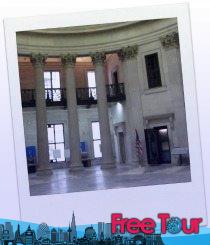Located in the heart of New York City, Federal Hall National Memorial is a historic site that embodies the early spirit of American democracy. Once the nation’s first capitol, this iconic building has played a crucial role in shaping the political landscape of the United States.
Today, Federal Hall National Memorial NYC serves as a museum and a memorial, commemorating the important events and figures of America’s founding era. Visitors can explore its rich history through exhibits and guided tours, learning about the legacy that continues to influence the nation today.

The History of Federal Hall National Memorial: A Landmark in NYC
The history of Federal Hall National Memorial is deeply intertwined with the early years of the United States. Originally built as a custom house in 1842, it became the site of the first Congress of the United States in 1789. Here, George Washington took his oath of office as the first President, marking a pivotal moment in American history and symbolizing the birth of the nation’s democratic governance.
Over the years, Federal Hall has undergone significant transformations, reflecting the evolving political landscape. It was designated as a national memorial in 1955, ensuring that the legacy of American democracy is preserved for future generations. The building itself is a testament to the architectural style of the time and serves as a reminder of the fundamental principles of liberty and justice.
Visitors to Federal Hall can explore various exhibits that highlight its historical significance. Key features include:
- The original staircase where Washington took his oath.
- Interactive displays detailing the significance of the first Congress.
- Sculptures and artworks celebrating influential figures from the Revolutionary War.
As a landmark in New York City, Federal Hall National Memorial not only commemorates the past but also encourages visitors to reflect on the ongoing journey of democracy in the United States. Its role in hosting significant events makes it a crucial site for understanding the American political system and the principles that continue to guide the nation today.
Exploring the Architectural Significance of Federal Hall National Memorial
Exploring the architectural significance of Federal Hall National Memorial reveals a blend of neoclassical design and historic importance. The building’s facade, adorned with impressive columns and a grand portico, exemplifies the ideals of democracy and governance that were central to the nation’s founding. Its design not only reflects the style of the late 18th century but also serves as a symbol of the values that shaped the United States.
The interior of Federal Hall is equally remarkable, featuring an expansive rotunda that showcases intricate details and historical artifacts. Key architectural elements include:
- Magnificent high ceilings that enhance the sense of spaciousness.
- Decorative moldings and craftsmanship that highlight the artistry of the period.
- Significant murals that depict pivotal moments in American history.
One of the most striking aspects of Federal Hall is its use of light and space to create an atmosphere of reverence and reflection. The strategic placement of windows allows natural light to flood the interior, drawing attention to the important exhibits that narrate the story of the nation’s beginnings. This thoughtful architectural design invites visitors to engage with the history and principles that continue to impact American society today.
As a vital landmark, Federal Hall National Memorial stands not only as a tribute to the past but also as a reminder of the ongoing evolution of American democracy. Its architectural significance serves as a powerful backdrop for the exploration of the American political system and the enduring principles of liberty and justice that resonate throughout the nation.
Top Things to See at Federal Hall National Memorial in New York City
When visiting Federal Hall National Memorial in New York City, one of the top attractions is the iconic statue of George Washington. This bronze statue, located at the entrance, commemorates his role as the first president and is a popular photo spot for tourists. It symbolizes the beginning of a new era in American history.
Another must-see feature is the grand rotunda, which serves as the heart of the memorial. This expansive space is adorned with impressive columns and intricate details that reflect the architectural grandeur of the time. Visitors can appreciate the historical significance of this area, where the first Congress convened. Key highlights include:
- Beautifully crafted decorative moldings.
- Educational plaques detailing the hall’s rich history.
- Stunning murals that depict critical events from the Revolutionary War.
Additionally, the original staircase where George Washington took his oath of office is a poignant reminder of the nation’s founding moments. This historic site not only serves as a physical representation of American democracy but also offers insight into the challenges and triumphs that shaped the country. Visitors can stand on the same steps that pivotal figures once walked.
Finally, don’t miss the interactive exhibits that bring the history of American democracy to life. These engaging displays allow guests to learn about the early political struggles and the founding principles that continue to influence the nation today. With its rich tapestry of history, Federal Hall National Memorial is an essential stop for those wanting to understand the roots of American governance.
Visiting Federal Hall National Memorial: Tips for Tourists
When planning a visit to Federal Hall National Memorial NYC, it’s essential to check the operating hours and any special events that may be happening during your visit. The memorial is open to the public, but certain tours or exhibits may have limited availability. Arriving early will allow you to enjoy a quieter experience and take in the historic atmosphere without the crowds.
To enhance your visit, consider joining a guided tour. Knowledgeable rangers provide insightful commentary on the significance of the site and its role in American democracy. Tours typically include access to key areas of the memorial, and you will gain a deeper understanding of the historical context surrounding the building. Be sure to ask questions; the rangers are enthusiastic about sharing their expertise!
Don’t forget to bring your camera to capture the stunning architecture and the iconic statue of George Washington. As you stroll through the memorial, take a moment to appreciate the intricate details and historical exhibits. To make the most of your experience, here are some tips:
- Wear comfortable shoes as you may spend considerable time walking.
- Check for any temporary exhibitions or events that may be taking place.
- Take advantage of the educational resources available, including pamphlets and interactive displays.
Lastly, consider visiting nearby attractions after your trip to Federal Hall. The memorial is centrally located, making it easy to explore other historic sites in Lower Manhattan. Whether you choose to walk along Wall Street or visit the National September 11 Memorial & Museum, your time at Federal Hall will enrich your understanding of the foundational moments in American political history.
The Role of Federal Hall National Memorial in America’s History
Federal Hall National Memorial holds a prominent place in America’s history as the site where the nation’s first Congress convened in 1789. This historic venue was not only the backdrop for George Washington’s inauguration but also a crucible for the early legislative processes that shaped the U.S. Constitution. The decision to host Congress here symbolized the transition from colonial governance to an independent democratic framework, marking the beginning of a new political era.
The memorial serves as a constant reminder of the ideals underpinning American democracy. Throughout its history, Federal Hall has witnessed significant events, including discussions that led to the Bill of Rights. The decisions made within its walls continue to reverberate through American political discourse, influencing the principles of freedom and equality that define the nation today. Visitors are encouraged to reflect on how these early legislative actions laid the groundwork for contemporary governance.
As a national memorial, Federal Hall also plays an educational role, offering insights into the struggles faced by early American leaders. The exhibits highlight key figures and events, illustrating how the founding fathers grappled with the concepts of liberty and justice. This historical context fosters a deeper understanding of the American political system and encourages dialogue about its evolution. By preserving the legacy of these pivotal moments, Federal Hall inspires future generations to engage with the ideals of democracy.
Moreover, Federal Hall National Memorial acts as a gathering place for civic dialogue and reflection. Special events and programs held at the site invite the public to engage with the history and principles of democracy actively. By bringing people together, the memorial not only commemorates the past but also cultivates a spirit of participation in the ongoing journey of American democracy. Its role transcends mere remembrance, serving as a catalyst for community engagement and historical exploration.
Events and Exhibitions at Federal Hall National Memorial NYC
Federal Hall National Memorial hosts a variety of events and exhibitions throughout the year, celebrating the rich history of American democracy. Visitors can participate in guided tours that not only illuminate the building’s significance but also delve into specific themes, such as the founding fathers’ vision for the nation. Special programs often coincide with national holidays, offering a unique opportunity to engage with the past in a meaningful way.
Additionally, the memorial features a rotating schedule of temporary exhibitions that showcase artifacts and stories related to American political history. These exhibitions may include:
- Documented letters and speeches from pivotal figures.
- Art installations that reflect on the principles of democracy.
- Interactive workshops designed to educate participants about civic engagement.
Throughout the year, Federal Hall also organizes community events aimed at fostering dialogue around contemporary issues and their historical contexts. These gatherings encourage participation and reflection, making the memorial a lively hub of discussion. Notable events include:
- Lectures by historians and political scientists.
- Commemorative ceremonies on significant anniversaries.
- Cultural performances that highlight the diversity of American voices.
By attending these events and exhibitions, visitors not only gain a deeper understanding of the American political system but also participate in the ongoing narrative of democracy. Federal Hall National Memorial serves as both a historical landmark and a vibrant center for civic engagement, inviting individuals to reflect on the past while actively contributing to the future of the nation.






